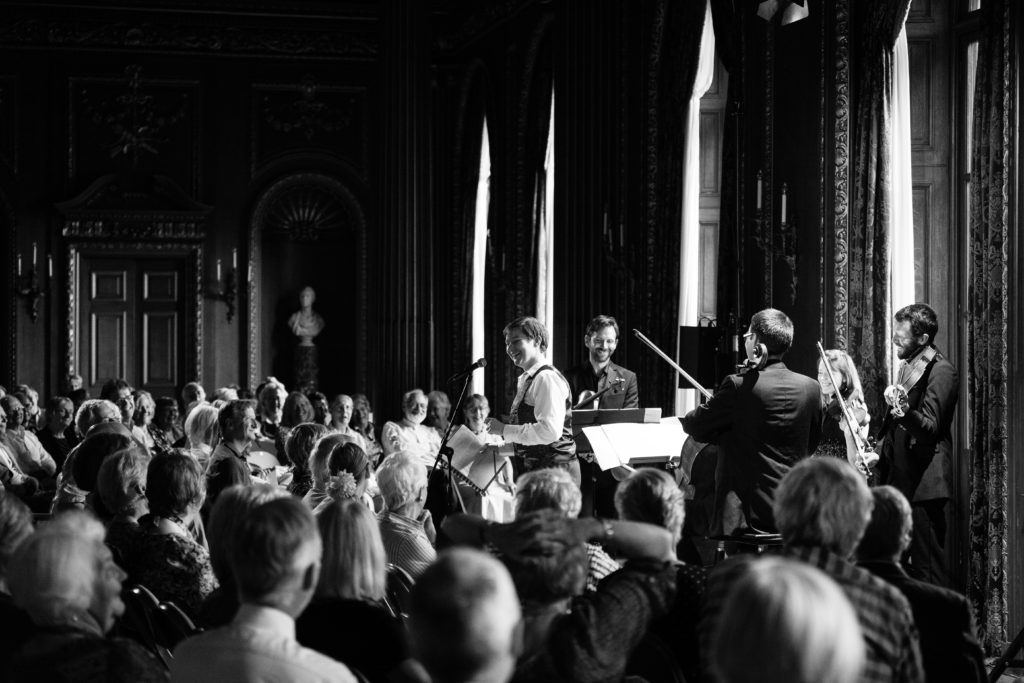Music with friends
Last week saw my annual visit to the beautiful Howardian Hills in Yorkshire, for the glorious Ryedale Festival. This is the third year in a row that I’ve had the privilege of speaking at Ryedale, and for the first time this year I was not there primarily to work with a string quartet, but on a selection of repertoire for strings, piano and voice: the late works of Franz Schubert. And as if that weren’t wonderful enough, in addition to these three Schubert talks, I was also interviewing the Festival’s composer-in-residence for 2017, Sally Beamish. It was a busy, and very rich, few days.

Concert introduction with the Heath Quartet at the Ryedale Festival 2016, © Gerard Collett
The one thing we all tend to associate with Schubert is the so-called Schubertiaden: gatherings of friends, fellow artists, and (from time to time) the great and the good to listen to his music in a private setting. There would be songs and piano duets, sometimes larger chamber works, poetic recitations, party games, dancing (with poor Schubert sweating away at the keyboard to provide the music), food and drink. These were convivial occasions, and the core group of friends often ended up in the pub together after the proceedings were over. Their friendship was a constant source of inspiration, too: new words that might be set to music, new ideas for operatic scenarios, gifted musical friends and pupils for whom Schubert might write new pieces, poetry inspired by the astonishing skill and speed with which he created new work after new work.
The Festival, too, is a place of friends. As a returning presenter, I was greeted not only by members of the hard-working, apparently never-sleeping organisational team, but also by audience members who had attended on previous years. We reminisced about the spellbinding performances of the Heath Quartet and Jeremy Irons in 2016, the magical pairing of Haydn and Bartók in 2015. I heard about all the musical highlights of the intervening year, the new discoveries that listeners had made, and reminiscences from those who sang and played themselves about pieces they had recently performed. I was given recommendations of places to visit, views that couldn’t be missed, and filled in on the new venues I had the chance to see in Festival events this year. There is nothing quite like standing in front of a packed church’s worth of smiling, expectant faces who you know – despite it being ten o’clock on a Monday morning, with the wind whipping the walls and clouds gathering overhead – are going to listen to every word you say, and be on your side whilst you say them. And goodness knows I wouldn’t have tried explaining mediant modulations to many crowds under such circumstances. Particularly when I was playing keyboard examples myself, knowing that the likes of Llŷr Williams or Danny Driver were in the vestry and hearing every note of it.
But the musicians too, of course, are friends and support each other. And this was really brought out in my conversation with Sally Beamish. She spoke warmly of the many composers for whom she’d worked as a violist – including Oliver Knussen and Peter Maxwell Davies – who had given so generously of their time and help to sit with her, work through her compositions, make suggestions; and in Max’s case, to help persuade her at last to move to Scotland, where she has been living so happily ever since. Sally was not only showcasing her own works at Ryedale: she was also playing the piano, and the viola, and reciting. Every rehearsal I was privileged to overhear, with her and with others, from young musicians at the start of their career to fully established and internationally-renowned performers, was a joyful act of collaboration. And as Sally said herself, the composition, without the assistance of performers, actually makes no noise at all. A pristine manuscript is all very well, but it won’t play itself. Her eloquent descriptions of the places, traditions, stories and people who inspired her and commissioned her reminded me of Schubert, borrowing volumes of poetry from his friends – occasionally even accepting poetry that they wrote themselves – or holding a particular performer in mind as he wrote. No poet, no song. No performer, no sounding composition. No audience, no one to enjoy the fruits of those labours. We all need each other to make music work, to make it into a sounding and shared phenomenon. It’s the great privilege of my job: with my colleagues and my friends – on the platform and in audiences as friendly and dedicated as that of the Ryedale Festival – I find myself part of that convivial, collaborative situation so often. For that, I can only thank them all for making such wonderful events possible.


Well said, Katy. I too enjoyed my visit to Ryedale, as did the clients from Martin Randall with whom I came. Sorry our schedule precluding hearing your talks, though.
JB